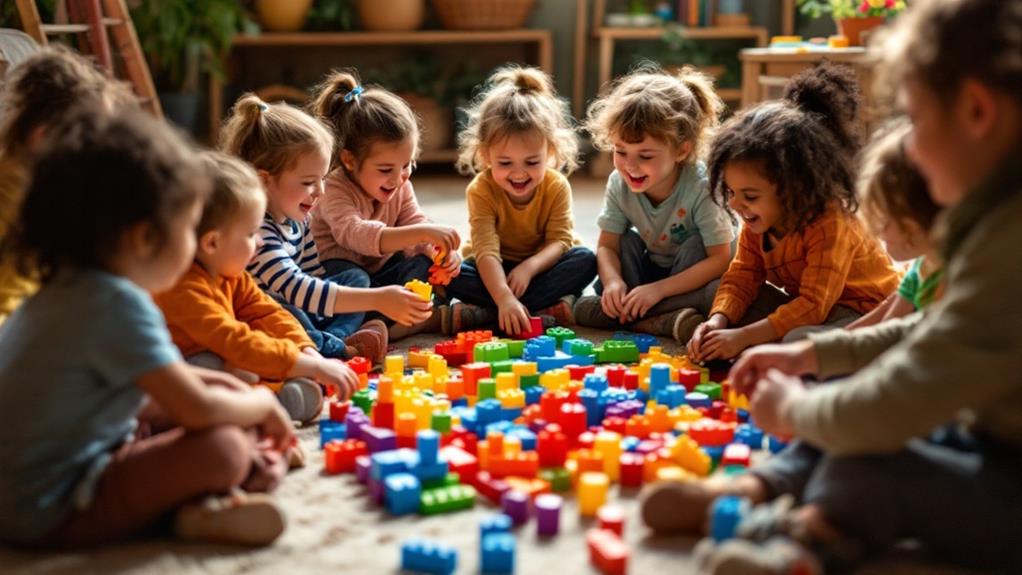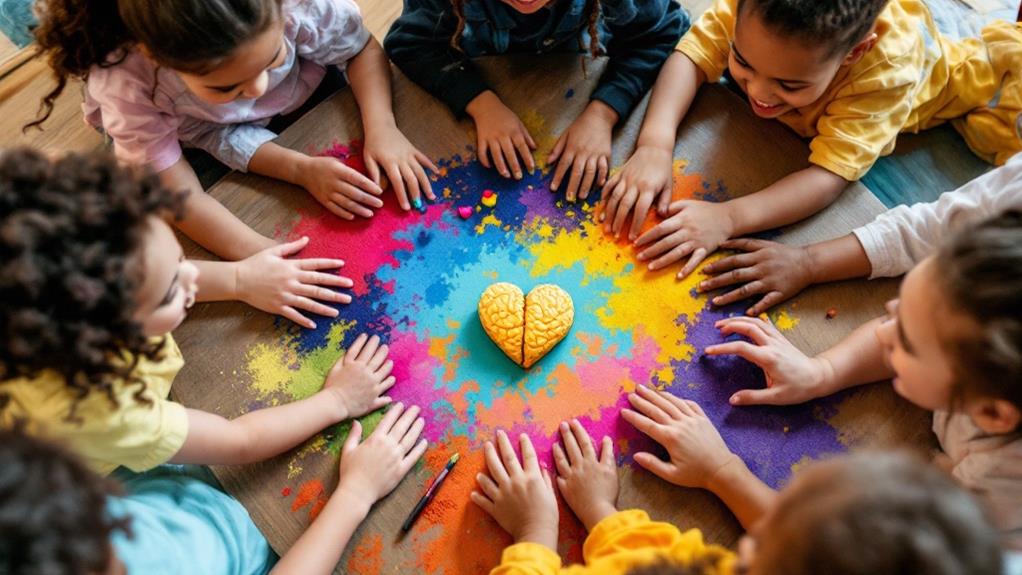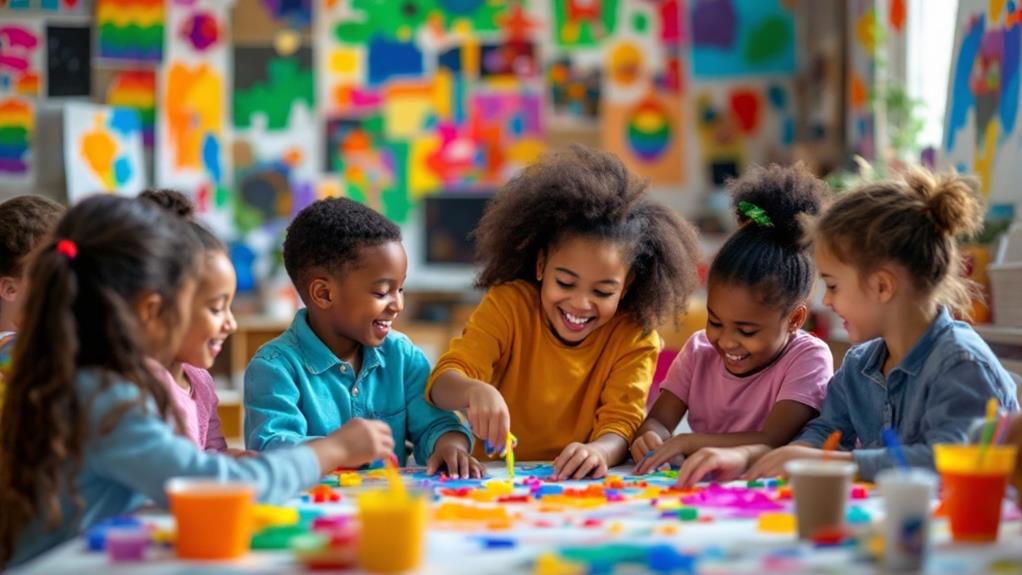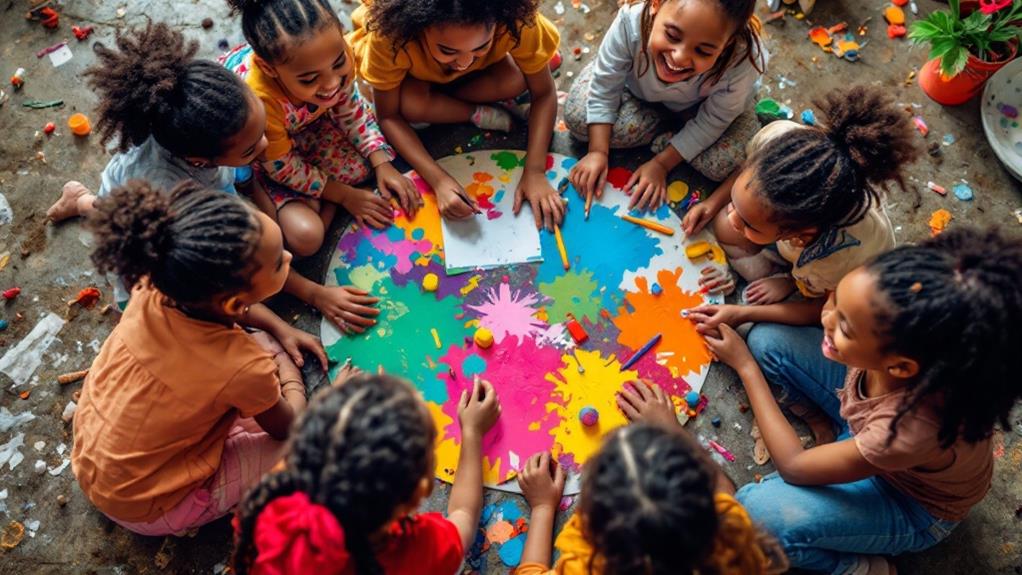Social skills groups help you and your child build lasting friendships by creating a safe space where kids can practice communication and emotional skills. Through fun activities, they learn to express themselves confidently, recognize emotions, and understand the feelings of others. This not only fosters empathy but also enhances teamwork; children work together, resolving conflicts and celebrating achievements. As they share experiences, anxious feelings often transform into excitement, nurturing bonds that can last a lifetime. Ultimately, these sessions lay the foundation for healthier relationships and greater emotional well-being, leading to exciting opportunities for connection ahead.
Key Takeaways
- Social skills groups provide a safe environment for children to practice communication and emotional regulation, fostering friendship-building skills.
- Structured activities promote teamwork and collaboration, enhancing trust and a sense of community among peers.
- Role-playing scenarios allow children to navigate social situations, boosting confidence in initiating and maintaining friendships.
- Empathy development through sharing experiences nurtures compassion, helping children connect on a deeper emotional level.
- Positive peer interactions in group therapy lead to lasting friendships, contributing to overall emotional well-being and personal growth.
Understanding Social Skills Groups

Understanding social skills groups can be a game changer for children traversing the complex world of social interactions. These groups create a safe environment where kids can explore and practice essential social skills alongside their peers. You might see your child facing challenges in making friends or communicating effectively, and that's where these groups come in. They offer structured activities that focus on cooperation, empathy, and understanding social cues.
In these sessions, children learn to navigate various scenarios, from initiating conversations to resolving conflicts. You'll notice that as they engage in role-playing or group discussions, they begin to gain confidence in expressing themselves. This newfound confidence can lead to improved relationships, not just in group settings but also in their everyday lives.
Moreover, being part of a social skills group helps children realize they're not alone in their struggles. They form bonds with others who share similar experiences, fostering a sense of belonging.
As they build these connections, you'll witness their emotional growth and resilience flourish, paving the way for meaningful friendships that can last a lifetime.
Building Communication Skills
In social skills groups, kids not only find support but also develop essential communication skills that can significantly impact their interactions. You'll notice how these sessions encourage children to express themselves more clearly and confidently. They practice verbal skills, like initiating conversations, asking questions, and sharing their thoughts. This practice helps them feel more comfortable speaking up, whether they're in a classroom or a playground.
Moreover, non-verbal communication is an important focus. Kids learn to read body language and facial expressions, which can enhance their ability to connect with others. By engaging in role-playing scenarios, they gain firsthand experience in maneuvering through different social situations, learning what works and what doesn't.
As they build these skills, you'll see them become more adept at forming friendships. They'll start to engage more with their peers, asking to join games or inviting others to join in activities.
This newfound confidence not only helps in making friends but also fosters a sense of belonging. In the end, the skills they develop in these groups will pave the way for meaningful and lasting connections throughout their lives.
Enhancing Emotional Intelligence

Emotional intelligence is an essential component of social skills that kids can enhance through group activities. When children engage in social skills groups, they learn to recognize, understand, and manage their own emotions while also becoming more attuned to the feelings of others. This growth fosters healthier and more meaningful relationships.
In these supportive environments, children can:
- Practice self-awareness: They learn to identify their emotions, which helps them articulate their feelings better.
- Develop emotional regulation: Kids discover techniques to manage their reactions, leading to more positive interactions.
- Build confidence: As they share experiences and feelings, they gain assurance in expressing themselves.
Promoting Empathy and Understanding
Empathy is an essential skill that can transform how children interact with their peers. In social skills groups, kids learn to recognize and appreciate the feelings of others, creating a safe space where they can express their own emotions too. This shared understanding fosters deeper connections, allowing friendships to blossom.
When you guide children through activities that encourage them to share personal stories, they begin to see life from different perspectives. They learn that everyone has unique challenges and joys, and this awareness nurtures compassion. By practicing empathy, kids develop the ability to listen actively, respond thoughtfully, and support their friends in meaningful ways.
Moreover, as children witness their peers maneuvering social situations, they gain insights into how to be present and supportive. Watching others express vulnerability helps them realize that it's okay to be open about their own feelings, which strengthens their bonds.
Ultimately, promoting empathy and understanding in social skills groups equips children with tools they'll carry throughout their lives. They'll not only build lasting friendships but also cultivate a genuine sense of kindness and respect for others that can positively impact their communities.
Encouraging Teamwork and Collaboration

Working together in social skills groups teaches kids the power of teamwork and collaboration. When children engage in group activities, they learn how to communicate effectively, share responsibilities, and respect each other's ideas.
These experiences help them realize that working together can lead to greater accomplishments than going it alone.
Here are a few ways teamwork and collaboration can enrich their social skills:
- Building Trust: Kids learn to depend on one another, fostering a sense of community.
- Enhancing Problem-Solving: Collaborating helps them approach challenges from different perspectives, leading to creative solutions.
- Boosting Confidence: Successfully completing a group task empowers children and encourages them to take risks in social situations.
Reducing Anxiety in Social Situations
In social skills groups, children not only learn to collaborate but also gain valuable tools to manage anxiety in social situations. You might see them practicing deep breathing techniques or role-playing different scenarios. These strategies help them feel more at ease when interacting with peers.
By simulating real-life situations in a safe environment, they learn to identify their triggers and use coping mechanisms effectively.
As they practice, kids discover they're not alone in their feelings of anxiety. Sharing experiences with others fosters a sense of belonging and understanding, which can be incredibly comforting. They can cheer each other on, celebrating small victories together, like initiating a conversation or asking someone to join a game.
This supportive atmosphere encourages resilience, empowering them to face social challenges outside the group. The more they practice, the more confidence they build.
Before long, those once-daunting social interactions become less intimidating.
Ultimately, these sessions help children transform their anxiety into excitement, motivating them to engage with others. With each step forward, they pave the way for meaningful connections and a brighter social future.
Creating Lasting Friendships

Friendship blossoms in the nurturing environment of social skills groups, where children learn to connect with their peers on a deeper level. In these sessions, they practice essential skills that foster trust and understanding, setting the stage for lasting relationships.
You'll witness the transformation as children share experiences, laugh together, and support one another, all while developing a sense of belonging.
Here are some key components that help create those lasting friendships:
- Shared Interests: Engaging in fun activities allows children to discover common passions, laying the groundwork for meaningful connections.
- Communication Skills: Practicing conversation techniques helps children express themselves and listen actively, deepening their interactions.
- Conflict Resolution: Learning to navigate disagreements teaches resilience and encourages healthy relationship dynamics.
As you guide children through these experiences, remember that the friendships formed in social skills groups can lead to lifelong bonds.
By fostering an environment of empathy and respect, you empower them to build connections that extend beyond the group, enriching their lives and the lives of others.
Together, they'll cultivate friendships that stand the test of time.
Long-Term Benefits of Group Therapy
The bonds formed in social skills groups often lay the groundwork for ongoing support and growth, highlighting the long-term benefits of group therapy. As you engage with peers who share similar challenges, you cultivate trust and understanding, essential elements for lasting friendships. These connections can provide a safety net, offering encouragement during tough times and celebrating achievements together.
Over time, the skills you develop in these sessions—like effective communication, empathy, and conflict resolution—become second nature. You'll find that maneuvering social situations becomes easier, empowering you to forge deeper relationships beyond the group. The confidence you gain extends to various aspects of your life, promoting not just friendships but also healthier interactions in school, family, and the community.
Moreover, these positive experiences can instill a sense of belonging and community, which is vital for emotional well-being. As you witness the growth of others in your group, it inspires you to keep pursuing connection and support.
Ultimately, the enduring friendships and skills you acquire in group therapy create a foundation that enriches your life, fostering an environment where you and your peers can thrive together.
Conclusion
Like a garden nurtured by sunlight and rain, social skills groups cultivate the seeds of friendship in children. By fostering communication, empathy, and teamwork, these sessions help kids blossom into confident, connected individuals. As they navigate the twists and turns of social interactions, they learn to support one another, creating a vibrant community. Embrace this journey—together, they can grow strong roots and build lasting bonds that flourish for years to come, turning friendships into a beautiful legacy.
